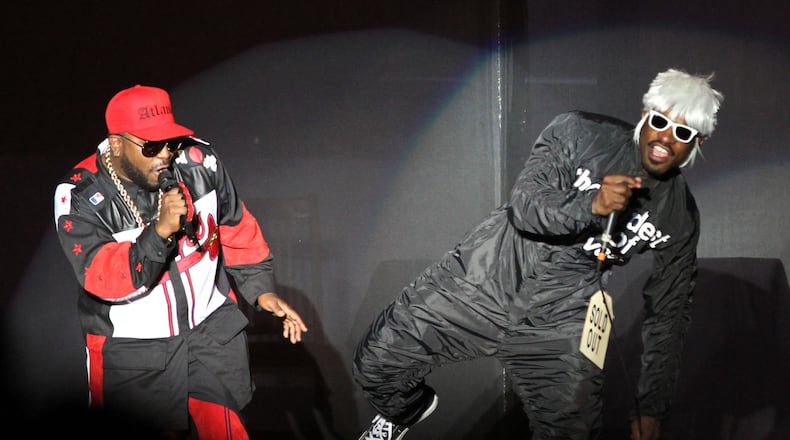The title “Chronicling Stankonia” might give the impression of an OutKast biography. But the subtitle, “The Rise of the Hip-Hop South,” spotlights the thesis of the new book by Atlanta author and academic Regina Bradley, Ph.D.
“I want people to have a conversation,” she said in a recent interview. “When writing, it made me think about my conversations about music and hip-hop with friends in the cafeteria back in the day. There’s academic jargon, but hopefully the book is accessible enough that we can continue to have conversations about why OutKast is so overdue about getting their flowers from the academy.”
She paused and laughed. “I guess they were waiting on me to write about it!”
Credit: Melissa Alexander
Credit: Melissa Alexander
Bradley, a Georgia native, was inspired to write her book after witnessing OutKast’s three exhilarating reunion concerts that drew more than 60,000 fans to Centennial Olympic Park in 2014.
By the time the duo of Antwan “Big Boi” Patton and Andre “3000” Benjamin triumphed during that 20th anniversary return, “The hip-hop South now had multiple generations, earmarked by significant historical and cultural events like Hurricane Katrina and the rise of social media,” she writes.
The climate was very different two decades earlier. The uniqueness that now colors OutKast as revolutionary pioneers was instead seen as weird. Additionally, they were from the South, a location that most music fans didn’t consider in the ’90s when talking about hip-hop and the Los Angeles/New York coastal rap wars.
Bradley recounts in “Chronicling Stankonia” that when OutKast won a Source Award in 1995 for best new rap group, Big Boi and Andre 3000 were booed by the New York crowd. Andre’s acceptance speech lamented that, “we got this demo tape and don’t nobody wanna hear it,” as the pair was showered with jeers.
But it was also in that same speech that Andre 3000 uttered the now-iconic rallying cry: “The South got something to say.”
It’s a theme that Bradley trumpets throughout her book.
An alumna Nasir Jones Hip-Hop Fellow at Harvard University, Bradley is an assistant professor of English and African diaspora studies at Kennesaw State University, where she teaches courses on Southern hip-hop and culture, among others.
Her students, reared on the idea that OutKast’s groundbreaking “Southernplayalisticadillacmuzik” and “Aquemini” albums were instant successes, sometimes need a reality check.
“I’m still often having to break that idea that Atlanta has been accepted since the beginning of time,” Bradley said. “No, no, no. That isn’t the case. That’s the Atlanta you inherited.”
Credit: Courtesy
Credit: Courtesy
Along with the trails blazed by Big Boi and Andre 3000, Atlanta’s blossoming hip-hop scene included the rhymes of CeeLo Green and Goodie Mob, of Pastor Troy, T.I. and the creation and evolution of trap music.
“I wanted to write a blueprint to have a more complex conversation about Southern hip-hop and this idea that contemporary style doesn’t stop with the civil rights movement in the South. I wanted to write the book I wanted to read about Southern rap and, me being from Georgia, of course I’m going to focus on the South,” Bradley said. “All of the artists that I used, that’s who I was listening to and growing up with, so it only felt natural.”
Bradley admits that finding a balance between her academic voice and her fandom for the music was a challenge. But she has other outlets that provide additional opportunities for her to blend her insights with musical appreciation, including the YouTube series “OutKasted Conversations” and her upcoming book from the University of Georgia Press, “OutKast Reader: Essays on Race, Gender and the Postmodern South,” featuring essays on race and gender in the South.
“I want this to be a stepping stone, not the end, of why OutKast is important,” Bradley said of her OutKast projects. “What they mean to me might be different than the next scholar. I’m from Georgia, so I can’t write about Mississippi rap or Memphis rap. But I feel like we are a collective, and so I hope the door swings open for others.”
Neither Andre 3000 nor Big Boi participated in the book. “I had to pull from the music and other people’s interviews and play detective a little bit,” Bradley said. But she hopes they’re aware of it and “get to read a little of it.”
Regardless, Bradley’s respect for the Atlanta hip-hop innovators and the wider range of “founding theoreticians of the hip-hop South” is unwavering.
“My husband asked, ‘Is OutKast still your favorite after writing about them?’,” Bradley said. “I was like, ‘Child, if they weren’t, I wouldn’t have been able to finish this book.’”
NONFICTION
by Regina Bradley
University of North Carolina Press
136 pages, $19.95
About the Author
Keep Reading
The Latest
Featured






